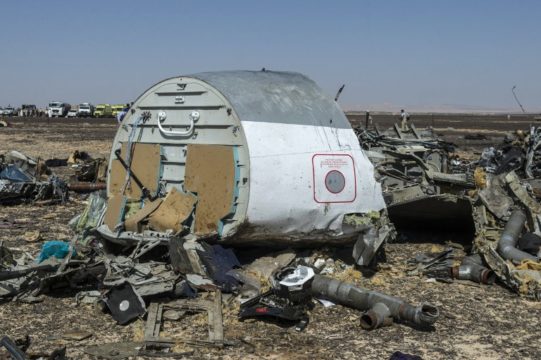Cockpit information from the Russian jet which crashed in Egypt’s Sinai Peninsula one week ago registered a noise in the last second of recording, the head of an investigation committee into the disaster said on Saturday.
But the committee head, Ayman al-Muqaddam, said experts were still gathering information and it was too soon to announce conclusions.
“A noise was heard in the last second of the CVR recording,” Muqaddam told a news conference in Cairo, referring to the cockpit voice recorder. The committee was analysing the cockpit voice records, he said.
“A spectral analysis will be carried out by specialised labs in order to identify the nature of this noise.”
Scientists have used such methods to examine the signature of dying cockpit recordings in aircraft bombings.
Comparing the frequencies may help determine whether the sound recorded on the Russian jet comes from a deliberate or accidental explosion.
CCTV’s Adel El Mahrouky was at the news conference and reports from Cairo.

Western governments have said the crash of the Airbus A321, which killed all 224 passengers, may have been caused by a bomb and several countries have suspended flights to the Red Sea resort of Sharm al-Sheikh from where the Russian plane took off.
Muqaddam said the crash occurred 23 minutes into the flight, when the auto-pilot was still engaged, and debris were scattered over a wide area extending for 13 km (8 miles) “which is consistent with an in-flight break-up”.
Referring to media reports citing Western intelligence sources pointing to the possibility that the plane was brought down by a bomb, Muqaddam said no evidence related to those claims had been provided to his team.
“The committee is considering with great attention all possible scenarios for the cause of the accident and did not reach till the moment any conclusion in this regard.”
Muqaddam said his team, including experts from Egypt, Russia, France, Germany and Ireland, was considering “all possible scenarios for the cause of the accident” but had not yet reached any conclusion. He said structural fatigue, a fuel explosion and even lithium batteries carried by passengers could be a cause.
“It may be the lithium batteries or one of the passengers, it may be an explosion in the fuel tank, it may be fatigue to the body of the plane. It may be that something exploded. All scenarios are considered,” he said.
The Islamic State-affiliated Sinai Province, which claimed it brought the plane down, said it acted in revenge for Russian air strikes against Islamist fighters in Syria, where Islamic State controls large areas in the east and north of the country.
On Friday, Moscow suspended flights to Egypt, leaving nearly 80,000 Russians stranded, mainly in the Red Sea resorts of Hurghada and Sharm al-Sheikh, and adding to the growing chaos facing many tourists.
British attempts to fly home thousands of holidaymakers on Friday ran into trouble when Egypt restricted the number of flights, citing capacity at Sharm al-Sheikh airport and British airliners’ refusal to take passenger luggage in the hold.
A British official at Sharm al-Sheikh airport said nine flights were expected to repatriate 2,000 stranded British tourists on Saturday, and the government hoped to get them all home within 10 days.
British media reported on Saturday that a British passenger jet came close to being hit by a rocket as it came in to land at Sharm al-Sheikh in August, although the British government said it had concluded the incident was part of routine Egyptian military exercises, not a deliberate attack.
The pilot of the Thomson flight from London to Egypt took evasive action after spotting the missile coming towards the plane as it flew to the Red Sea resort, the Daily Mail reported.
Story from Reuters.
 CGTN America
CGTN America Debris of the A321 Russian airliner lie on the ground a day after the plane crashed in Wadi al-Zolomat, a mountainous area in Egypt’s Sinai Peninsula, on November 1, 2015. International investigators began probing why the Russian airliner carrying 224 people crashed in the Sinai Peninsula, killing everyone on board, as rescue workers widened their search for missing victims. AFP PHOTO / KHALED DESOUKI
Debris of the A321 Russian airliner lie on the ground a day after the plane crashed in Wadi al-Zolomat, a mountainous area in Egypt’s Sinai Peninsula, on November 1, 2015. International investigators began probing why the Russian airliner carrying 224 people crashed in the Sinai Peninsula, killing everyone on board, as rescue workers widened their search for missing victims. AFP PHOTO / KHALED DESOUKI
